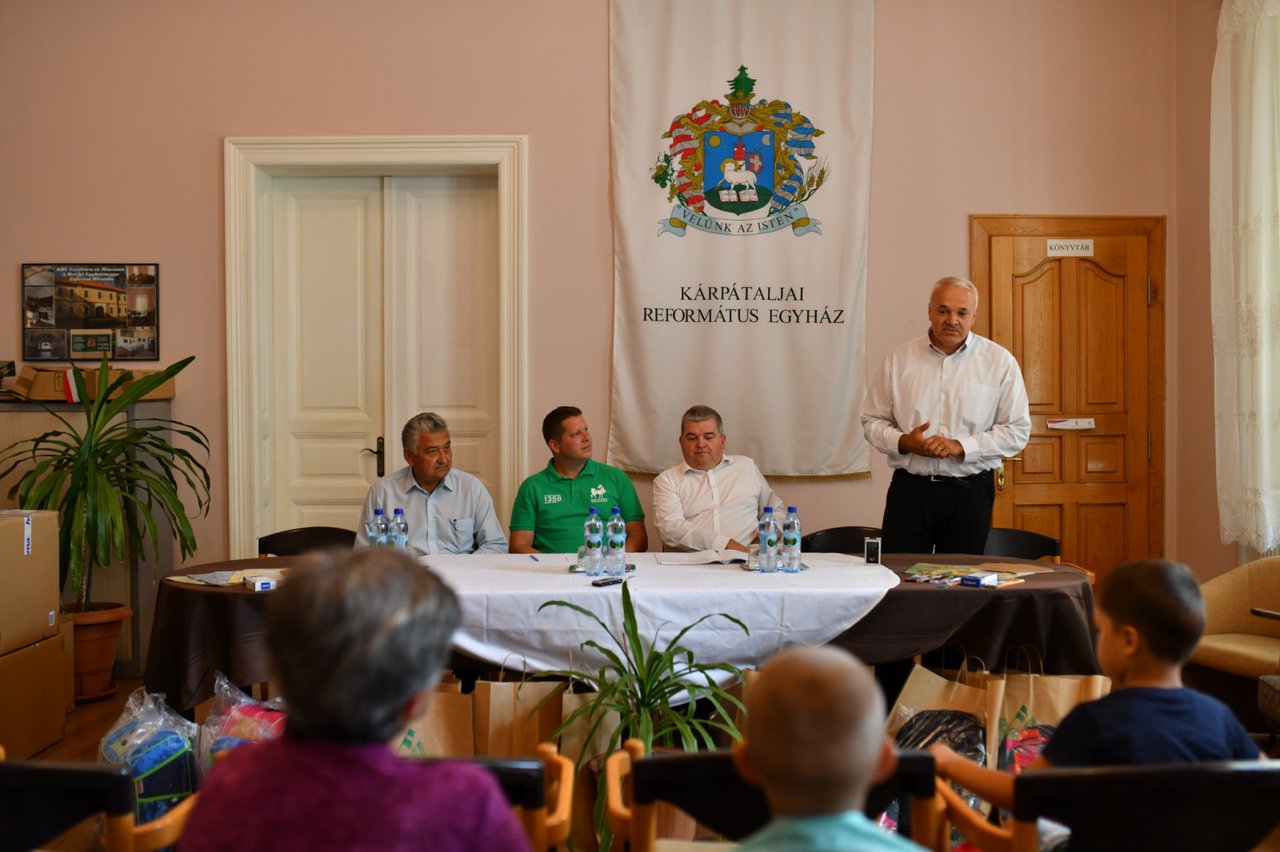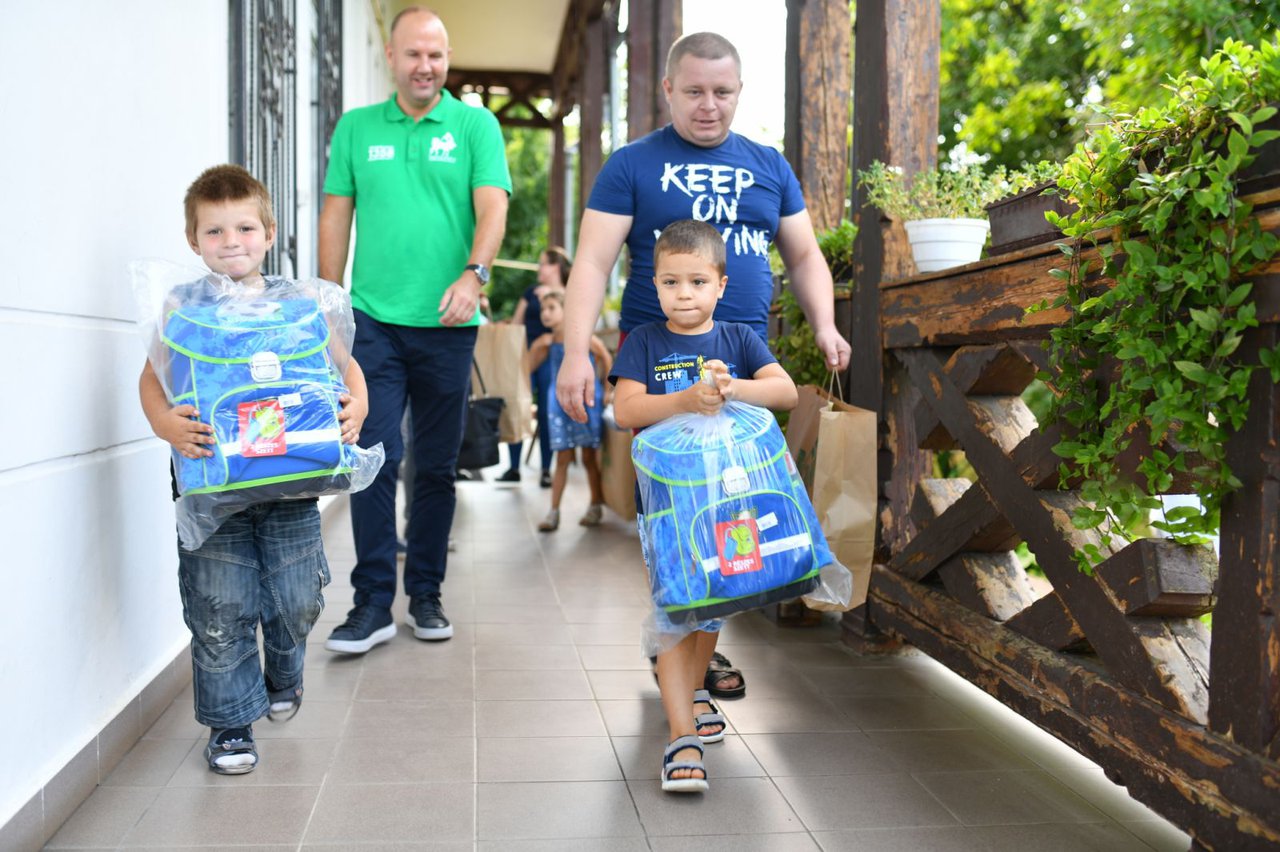A delegation of the Hungarian Reformed Church Aid (HRCA) travelled to Beregszász, a city near the Hungarian border, on last Tuesday. They did not arrive empty-handed. The delegation delivered one hundred schoolbags filled with school supplies to students in need in Transcarpathia, Ukraine, for the start of the school year, and one hundred thousand surgical masks to the institutions and congregations of the Transcarpathian Reformed Church.

Press Conference in Beregszász: Béla Nagy, Lay President of the Church, Márton Juhász, director of HRCA, Károly Czibere, chair of the Board of Trustees of HRCA, and Sándor Zán Fábián, Bishop of the Reformed Church in Transcarpathia
Since its foundation, the HRCA has been paying special attention to supporting Hungarians living beyond the border, and established its Transcarpathian coordination office in 2017.
The four-member delegation of the HRCA, together with the Bishop of the Transcarpathian Reformed Church District, Sándor Zán Fábián and the Lay President Béla Nagy, handed over the donations and visited several institutions that have been supported by HRCA in recent years.
“For the Hungarian Reformed believers, it has always been important and evident to live in faith, unity and to communicate with our brothers and sisters across the border. The most important expression of this was when in 2009 the Hungarian reformed churches of the region decided to express their unity in the form of a Common Synod, becoming part-churches of the Hungarian Reformed Church in the Carpathian Basin. In the face of peace treaties in Versailles after the 1st World War, we need to be able not only to demonstrate a sense of belonging together but also to create an institutional framework to confirm that we really care for each other, that we are truly looking after our brothers and sisters across the border,” said Károly Czibere, Chairman of the Board of Trustees of the Foundation, at a press conference in Beregszász (Berehove), a city near the Hungarian border.
Márton Juhász, executive director of HRCA, reminded that just as Jesus' disciples could not foresee how five thousand people would be fed with five fish and two loaves of bread, they could not always predict how they would be able to help. „A few months ago, we didn't know where we would get the money for this donation or where we would get enough school supplies to fill a hundred bags. We always start the work, announce the collection, and we find that God blesses us because there are always people who donate, stand with us and are eager to help,” added Márton Juhász.

Children received the schoolbags
After the delivery of the school supplies, the representatives of HRCA visited the “Nefelejcs” (Forget Me Not) children's rehabilitation centre in Mezővári with Bishop Sándor Zán Fábián, pastor pf the local congregation. The development of the institution was supported also by HRCA with twenty-two thousand euros thanks to Dutch donors. “The centre has made great progress in recent years thanks to donations: we started with two staff members and four children in 2013, now we have more than ten staff members and 76 children are currently connected in some way to the day care centre,” said the Bishop, who expressed his gratitude to the donors for the increasing number of families who know their children are safe in the centre.
Since 2014, the Reformed Church in Transcarpathia runs two rehabilitation centers for children and young adults with disabilities. The “Forget Me Not” Foundation of the Church, coordinated by Krisztina Badó, runs daycare home in Mezővári and Hetyen. This social project is based on surveys that took place in the towns nearby with the help of local pastors and clinics, and recorded the number of families in the 12 neighboring towns with loved ones with disabilities. The mission of the program is twofold: to do as much as possible so that the children may have a better life, and to help families who live their lives with such burdens and hardships. Beyond the rehabilitation of the children, the Church also tries to support the families. Conferences are organized for the parents involving specialists from different medical fields who give presentations on different topics, such as Autism. Currently 46 children are attending regular activities in Mezővári, and more than 40 children in Hetyen. Thirty-one colleagues are working in these institutions.
During their visit in Transcarpathia, the HRCA staff also visited the Élim Rehabilitation Centre in Hetyen, which the foundation helped to develop with a grant of five thousand euros, and then visited the Reformed Roma kindergarten in Nagydobrony, where contruction is near to being completed. After the kindergarten burned down in 2018, HRCA, with the help of around seven hundred Reformed congregations was able to contribute 26,6 million HUF to the reconstruction of the institution.
Thanks to private donations, HRCA has recently been able to support the fight against the coronavirus pandemic in Transcarpathia with hundreds of thousands of masks and protective gears, annually supports the camping of Transcarpathian children in need with one million forints, and recently contributed four million forints to the restoration of the storm-damaged Reformed Church in Viski.
The Reformed Church in Transcarpathia is the oldest Protestant Church in Ukraine. It was founded in 1921, when the Sub-Carpathian region became a part of the Czechoslovak Republic. During the Soviet era, the Church lost its legal status and many church-owned properties were seized and naturalized. The structure of the Church did not exist, atheist propaganda was promoted and many pastors were deported. Eventually, the fall of the Soviet Union brought relief, and with the help of Church sponsors, schools and churches were re-opened. The Church currently has around 70 000 members, most ethnic Hungarians, in nearly 100 congregations. It is organized into three Presbyteries: the Beregi, Ugocsai and Ungi Presbyteries. It is a constituting member of the Hungarian Reformed Church, which was established in May 2009 and consists of Hungarian-speaking Reformed communities in the Carpathian Basin. It is also a member church of the World Communion of Reformed Churches, just like CPCE and WCC.
Translated and edited by Réka Komáromi